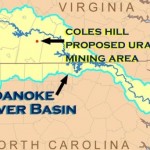 By Peter Galuszka
By Peter Galuszka
For months, Pittsylvania County has been a hotbed of controversy as Virginia Uranium tries to get a decades-old moratorium on uranium mining lifted so it can mine and refine a rich, 119-million pound deposit of the radioactive material near Chatham.
The latest intrigue involves a Board of Supervisors meeting in early September where members were going to consider a resolution asking that mining regulations be in place and that a fund be established to help residents whose properties might be damaged by a uranium accident. Mysteriously, the resolution was removed from the board’s agenda just before the meeting.
Supervisor Marshall Ecker claims that aides to Gov. Robert F. McDonnell, whose public stance has been to not pick sides on the uranium fight, called State Sen. Bill Stanley from the area and asked him to lobby supervisors to sidetrack the resolution.
Ecker also said that Stanley’s gubernatorial message was for the board to delay considering the resolution until next February or March. By that time, a governor-appointed study commission will have recommended whether to keep the uranium mining band or not and the General Assembly will probably have acted. Ecker wants to keep the ban.
“I know the governor’s people called Stanley and he started calling supervisors to tell them to get the item off the agenda,” Ecker told me.
When I called and emailed Jeff Caldwell, McDonnell’s press secretary, Caldwell got back to me very quickly. “This statement is not true,” he emailed. “No call was made to influence the BOS.” To underline the point, Caldwell then telephoned me to make sure I understood and said that the governor’s office had been in touch with Supervisor Ecker to set him straight and that I should call Ecker. I did. Ecker stood by his story.
I also called State Sen. Stanley, a Republican who is a political ally of McDonnell. “The governor did not call me about this at all. Nor did anyone from his office,” Stanley told me.
He added, however, that he had read the proposed resolution that had been drafted by Ecker. Stanley said the resolution was “badly written” and would do little other than annoy people from both the pro and con sides and “hurt economic development in our area.”
Stanley admits that he did telephone some of the supervisors to urge them to squash the resolution before the Board of Supervisors meeting but it had nothing to do with any calls from McDonnell or his people.
The senator said he doesn’t want to get the cart before the horse. He says the county should not take a stand until the study commission has made its recommendations and the General assembly has acted. He opposes the spiked resolution calls to set up “a monetary fund. . . which would be administered by a third party, to compensate County citizens adversely affected by uranium mining.” The fund could be tapped by residents living with five miles of the mine site.
Stanley doesn’t like the fund idea because he says that if there is an accident, the taxpayers should not be stuck paying the bill. “The company should pay,” he said. He did not address the possibility that victims might have to wait years for legal proceedings against Virginia Uranium or other operator which may or may not be in business at the time of any settlement.
The dead resolution also called that “appropriate regulations be in place either by the Nuclear Regulatory Commission and or by the State of Virginia for the most comprehensive protection of out citizens.” Stanley says he will insist on the best regulatory protection for local residents when and if the mine is in operation.
The resolution battle is another in a series of controversies surrounding Virginia Uranium. The firm has taken state legislators on expense-paid trips to France, including stopovers in Paris, to tour shut-down uranium mines that the company claims are no environmental hazard. The firm has also engaged in a well-funded marketing campaign to convince the public that mining is safe despite considerable doubt.
Their first hurdle is to have the General Assembly lift the 23-year-old uranium moratorium. Virginia also has no regulations on uranium mining or refining. A National Academy of Sciences report recently stated that there is considerable risk in proceeding with the project in Southside Virginia because of the lack of rules and experience. Cities such as Virginia Beach get their drinking water from lakes nearby and have voiced opposition to mining.
McDonnell has organized a study group to give him a recommendation by year end but the group has drawn criticism because it is long on lobbyists and short on scientific experts. It also was hit at first for limiting public input in its hearings.
Local worries about uranium remain unaddressed. A poll released Sept. 12 by the Alliance for Progress in Southern Virginia showed that a majority of people – 53 percent – in the area opposed mining while 29 percent favored it. The research was conducted by Virginia Commonwealth University which polled 551 residents in Danville and Pittsylvania County. The mining controversy seems to have an extra-long half life.


